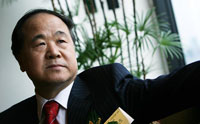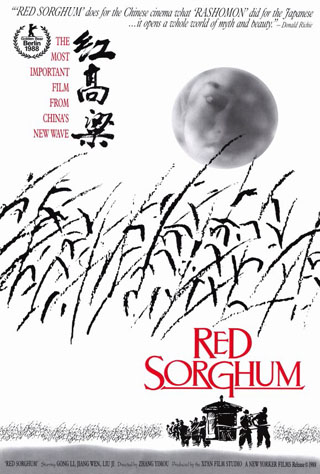“Chinese author Mo Yan is the recipient of the 2012 Nobel prize for literature,” reports FirstPost. “Mo Yan, which means ‘don’t speak’ is the pen name of Guan Moye. Time magazine described his work as having ‘tackled China’s tumultuous past century with a mix of magical realism and sharp-eyed satire that has made him one of the most famous, oft-banned and widely pirated of all Chinese writers.’ His work is said to be predominantly social commentary, and he is reportedly strongly influenced by the political critique of Lu Xun and the magical realism of Gabriel Garcia Marquez…. He is best known for his novel Red Sorghum which was turned into a prizewinning 1987 movie by director Zhang Yimou and picked by Chinese readers in a 1996 poll as their favorite novel.”
The Guardian is all over this story; here’s online film editor Andrew Pulver: “Made in 1987, Red Sorghum is one of China’s most influential films—along with Chen Kaige’s Yellow Earth it was a key film in the ‘fifth generation’ movement which revolutionized the country’s filmmaking by helping it confront the traumas of the cultural revolution. Its director Zhang Yimou and star Gong Li rocketed to international stardom after the film won the top prize at the 1988 Berlin film festival, and they became a glamorous offscreen couple too—Zhang went on to considerable acclaim with films like Raise the Red Lantern, Hero and House of Flying Daggers (as well as discovering Zhang Ziyi, Gong Li’s most visible successor), as well as directing the opening and closing ceremonies of the Olympic Games. Cinematically, Red Sorghum achieved a fantastically rich color palette in its politically less-than-correct depiction of Chinese peasant life—blood and earth predominate—and trod a careful political line by focusing on atrocities by the invading Japanese rather than internal repression.”
Zhang Yimou’s Happy Times (2000) is also based on a novel by Mo Yan, Shifu, You’ll Do Anything for a Laugh. Reviewing the film for the Voice in 2002, Michael Atkinson found it “beholden to hoary formulas—specifically, every selfish-curmudgeon-saddled-with-inconvenient-child retread since Little Miss Marker. Zhao (Zhao Benshan) is a poor, love-hungry retiree struggling to marry a duplicitous sow (Leng Qibin), whose wish to unload blind teenage stepdaughter Wu Ying (Dong Jie) becomes a deal maker/breaker. Zhao begins financing his connubials by sprucing up an abandoned bus to lease to horny lovers (one of several plot tangents that must make more sense in China); soon, his concern for the thorny and all-but-unwanted Wu Ying dominates his life. With no eye on the near future, Zhao and his retired buddies trick the waif into thinking she has a legitimate job by fabricating a fake massage parlor—convincing only to the touch—in the middle of an unused warehouse. That Zhang would make such a strainingly cute film—with a blind orphan at its center, no less—indicates where his ambitions have wandered. The material is broad, but Zhang exercises capable restraint, ensuring that the tender repartee never escalates into vaudeville.”
Updates, 10/12: The New Yorker‘s Richard Brody points us to Mo Yan’s recollection in 2005 (available to subscribers of Le Monde) “in which he described what he calls ‘an event that I’ve never forgotten and that remains tied to today’s political and social life’—and it was a movie that he saw in 1973, The Flower Girl, made in North Korea, directed by Kim Jong-il, based on an opera that was written by Kim Il-sung…. That astonishing essay becomes all the more relevant in the cinematic context that first brought Mo’s name to light here, the 1988 release of Zhang Yimou’s film Red Sorghum… I’m tempted to say that it still seems, in many ways, ‘stereotyped, schematic, and simplistic.’ It certainly doesn’t make particularly original uses of the medium of movies, and Zhang’s compositions are impersonally expressive and impersonally pretty. But it’s impossible not to be moved, if in a very familiar and unoriginal way, by the sufferings of the characters—and, in particular, by the cruelty and torture, physical and mental, endured by Chinese villagers under the yoke of the invading Japanese army.”
David Liu reminds us that “Zhang’s fellow Beijing Film Academy classmate Huo Jianqi adapted Mo’s short story ‘The White Dog and the Swing’ into his 2003 feature Nuan, a small-scale rural drama about love and lost innocence in modern China.”
In the Independent, Nick Clark and Clifford Coonan report that Ai Weiwei has called this prize an “insult to humanity and to literature.” Writing in the New Republic, Carlos Rojas, author of The Naked Gaze: Reflections on Chinese Modernity, traces “China’s obsessive fascination with the Nobel Prize for literature” and disagrees with Ai Weiwei: “The Chinese people can happily let go of their literary Nobel complex—a deserving literary hero has been duly commended.”
The Literary Saloon gathers relevant links and the TLS collects its reviews of Mo Yan’s work.
Updates, 10/14: Howard Goldblatt in the Guardian: “As Mo Yan’s English-language translator, I can’t help but feel a bit of pride, not so much for my work on his wonderful novels, but for having the insight or good fortune to spot him as a new and exciting writer a couple of decades ago. When I wrote to ask for permission to translate The Garlic Ballads (delayed till after the publication and movie of his breakthrough novel, Red Sorghum), he was a bit of a nobody and I an academic with a good Chinese name. He couldn’t have been happier, nor could I. Seems we’ve come full circle.”
For the Los Angeles Review of Books, Jeffrey Wasserstrom talks with Sabina Knight, who teaches Chinese and Comparative Literature at Smith College and is the author of Chinese Literature: A Very Short Introduction: “Mo Yan is a brave and unflinching writer. His novels portray graphic violence, rape, even a butcher skinning a prisoner alive, as well as the corruption of officials enforcing the one-child policy. He chronicles many of the horrors of 20th-century Chinese history, and in my interpretation that includes Mao’s Cultural Revolution. But rather than depict the Cultural Revolution directly, he sets many of his works during World War II when the Japanese brutally invaded China. This historical setting adroitly sidesteps the Party’s sensitivities, and thus flies underneath the censors’ radar. But astute readers may perceive a subtext grappling with the horrors that Chinese citizens inflicted on one another during Mao’s cultural revolution.”
For news and tips throughout the day every day, follow @KeyframeDaily on Twitter and/or the RSS feed. Get Keyframe Daily in your inbox by signing in at fandor.com/daily.





